The Role of Prophet Muhammad on Women Emancipation in Mecca Period
Downloads
Islam as one of the religions in the world has several types of social interaction. The way of interaction is called silaturahmi, one of the most pivotal topics in it is communication among Moslem start from Prophet Muhammad spread the Islamic values including in terms of social treatment to others. This article focuses on Prophet Muhammad endeavor for women’s emancipation, the struggle begins with the Mecca period until he died. The studying aim is to find out in-depth the prophet Muhammad method and the impact of a social system in there. The method used in this study is descriptive qualitative research expected to be able to reveal qualitative information with description-analysis using the strategy used in this research is a case study. The result indicates the guidance and awareness of women emancipation through the prophet Muhammad strategies pose a huge impact on belief in improving women position in society using the thoughts of feelings and actions in accordance with the teachings of religion in the context of Islam the teachings of revealed Book “ the Quran and the Sunnahâ€.
Islam sebagai salah satu agama yang memiliki beberapa tipe interaksi sosial. Cara interaksi tersebut dikenal dengan istilah silaturahmi, salah satu topik paling utama di dalam komunikasi antara muslim dimulai semenjak Nabi Muhammad menyebarkan nilai keislaman termasuk dalam hal perlakuan sosial kepada orang lain. Artikel ini fokus kepada upaya Nabi Muhammad dalam emansipasi perempuan, usaha tersebut dimulai pada periode Mekah hingga ia meninggal. Penelitian ini bertujuan untuk memahami metode Nabi Muhammad dan dampaknya terhadap sistem sosial pada masa tersebut. Metode yang digunakan adalah penelitian kualitatif yang diharapkan mampu untuk mengungkap informasi kualitatif dengan analisa deskriptif menggunakan cara studi kasus. Hasil penelitian ini menunjukan bahwa bimbingan dan kepedulian terhadap emansipasi perempuan melalui strategi Nabi Muhammad memberikan dampak yang signifikan dalam peningkatan posisi perempuan di dalam masyarakat menggunakan pemikiran dan tindakan yang sesuai dengan ajaran agama Islam yaitu “Al-Quran dan Sunnahâ€.
Books
Al-Bajuri, Abdullah, Al-Mar’ah al-‘Arabiyyah fî Jâhiliyyatihâ wa Islâmihâ (Madinah: Maktabah Tsaqafah, t.t)
Al-Buthi, Sa’id Ramadhan, Fiqh al-Sîrah (Damascus: Dar al-Fikr, 2008)
Al-Jumal, Ibrahim, Zaujât al-Nabiy Muhammad, 2nd edn (Cairo: Maktabah Wahbah, t.t)
Al-Mas’udi, Murûj al-Dzahab wa Ma’âdin al-Jauhar (Beirut: Dar al-Ma’rifah, t.t)
Al-Mubarakfuri, Shafiyyurahman, Rahîq al-Makhtûm (Cairo: Dar al-Wafa, 2005)
Al-Muththallibi, Ibn Ishaq, Kitâb al-Siyar wa al-Maghâzî (Beirut: Dar al-Fikr, 1975)
Al-Thabari, Târîkh al-Umam wa al-Mulûk, 5th edn (Cairo: Dar al-Ma’arif, t.t)
Ali Engineer, Asghar, Pembebasan Perempuan (Yogyakarta: LKIS, 2003)
Barlas, Aslma, Believing Women in Islam (Texas: University of Texas Press, 2019)
Bukhari, Al-Jâmi’ al-Shahîh, 6th edn (Cairo: Maktabah Wahbah, t.t)
Faqih, Mansour, Analisis Gender dan Transformasi Sosial (Yogyakarta: Pustaka Pelajar, 2007)
Hajar, Al-‘Asqalani Ibn, Al-Ishâbah fî Tamyîz al-Shahâbah (Beirut: Dar al-Kutub al-‘Ilmiyyah, 1994)
Hazm, Ibn, Jawâmi’ Sîrah Nabawiyyah (Beirut: Dar al-Kutub, t.t)
Hisyam, Ibn, Sîrah Ibn Hisyâm (Cairo: Musthafa al-Bab al-Halbi, 1955)
Ibn Sa’d, Muhammad, Thabaqât al-Kubrâ (Beirut: Dar al-Kutub al-‘Ilmiyyah, t.t)
Jawwad, Ali, Al-Mufashshal fî Târikh al-‘Arab Qabl al-Islâm (Cairo: Dar al-Saqi, 2001)
Miftahuddin, Islam dan Muhammad dalam Perspektif Historis (Yogyakarta: Faculty of Social and Economy, Yogyakarta State University, 2008)
Murata, Sachiko, The Tao of Islam (New York: State University of New York, 1992)
———, The Tao of Islam (Bandung: Mizan, 2004)
Muslim, Al-Jâmi’ Al-Shahîh, 1st edn (Cairo: Maktabah Wahbah, t.t)
Nasif, Fatima Umar, Menggugat Sejarah Perempuan (Jakarta: Cendikia Sentra Muslim, 2001)
Schirrmacher, Christine, Islam and Society, ed. by Tunnicliffe. Geoff (Bonn: Verlag für Kultur und Wissenschaft, 2008)
Umar, Nasarudin, Argumen Kesetaraan Gender Perspektif al-Qur’an (Jakarta: Paramadina, 2001)
Wadud, Amina, Inside The Gender of Jihad (Oxford: Oneworld, 2006)
Journals
Abukari, Abdulai, ‘Education of Women in Islam: A Critical Islamic Interpretation of the Quran’, Religious Education, 109.1 (2013), 12.
Esposito, Jhon L, ‘Women Right in Islam’, Islamic Studies, 14.2 (1975), 99.
Hunawa, Rahmawati, ‘Kedudukan Suami-Istri (Kajian Surah an- Nisa’ [4]: 34)’, Potret, 22.1 (2018), 1-12.
Ismail, Zaky, ‘Perempuan dan Politik pada Masa Awal Islam (Studi Tentang Peran Sosial dan Politik Perempuan pada Masa Rasulullah)’, Review Politik, 06.01 (2016), 140–59
Junaidi, Heri, and Abdul Hadi, ‘Gender dan Feminisme dalam Islam’, Muwazah, 2.2 (2010), 245–56
K. Ferdows, Adele, ‘Women and the Islamic Revolution’, International Journal of Middle East Studies, 15.2 (1983), 54
Muhibbin, Zainul, ‘Wanita dalam Islam’, Jurnal Sosial Humaniora, 4.2 (2011), 109–20
Mustikawati, Citra, ‘Pemahaman Emansipasi Wanita’, Kajian Komunikasi, 3.1 (2015), 65–70
Sidani, Yusuf, ‘Women, Work, and Islam in Arab Societies’, Women in Management Review, 20.7 (2005), 499
Smith, Jane I, ‘Women in the Afterlife: The Islamic View as Seen from Qur’Än and Tradition’, The American Academy of Religion, 43.1 (1975), 40
Sufiyana, Atika Z, ‘Relasi Gender dalam Kajian Islam “the Tao of Islam, Karya Sachiko Murataâ€â€™, Tadrib, 3.1 (2017), 121.
Syarifudin, Achmad, ‘Peran Strategis Kaum Perempuan dalam Mewujudkan Masyarakat Religi’, An-Nisa’a, 12.1 (2017), 31
Yusuf, Kadar M, ‘Model Emansipasi Qurani terhadap Kaum Perempuan’, Al-Fikra: Jurnal Ilmiah Keislaman, 11 (2012), 100.
Authors who publish with this journal agree to the following terms:
- Authors retain copyright and grant the journal right of first publication with the work simultaneously licensed under a Creative Commons Attribution License that allows others to share the work with an acknowledgment of the work's authorship and initial publication in this journal.
- Authors are able to enter into separate, additional contractual arrangements for the non-exclusive distribution of the journal's published version of the work (e.g., post it to an institutional repository or publish it in a book), with an acknowledgment of its initial publication in this journal.
- Authors are permitted and encouraged to post their work online (e.g., in institutional repositories or on their website) prior to and during the submission process, as it can lead to productive exchanges, as well as earlier and greater citation of published work (See The Effect of Open Access).









